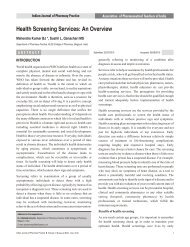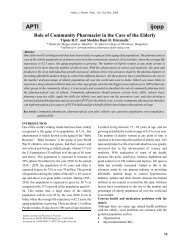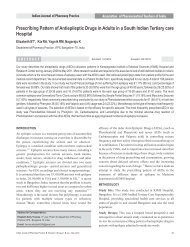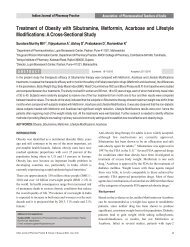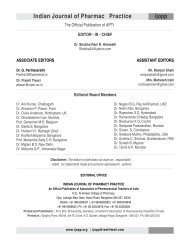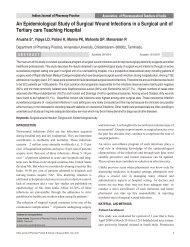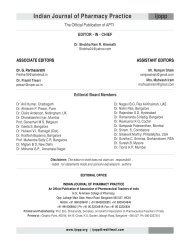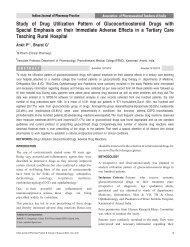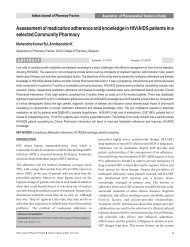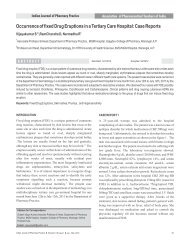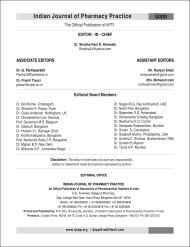Jul-Sep, 2012 - Indian Journal of Pharmacy Practice
Jul-Sep, 2012 - Indian Journal of Pharmacy Practice
Jul-Sep, 2012 - Indian Journal of Pharmacy Practice
Create successful ePaper yourself
Turn your PDF publications into a flip-book with our unique Google optimized e-Paper software.
<strong>Indian</strong> <strong>Journal</strong> <strong>of</strong> <strong>Pharmacy</strong> <strong>Practice</strong>Association <strong>of</strong> Pharmaceutical Teachers <strong>of</strong> IndiaAssessment <strong>of</strong> Knowledge Perception and Attitudes on Medications in GeneralPopulationAishwaryalakshmi K*, Sasikala B, Sreelalitha N, Vigneshwaran E and Padmanabha YRDepartment <strong>of</strong> <strong>Pharmacy</strong> <strong>Practice</strong>, Raghavendra institute <strong>of</strong> pharmaceutical education and research, Anantapur, Andhra Pradesh, India.A B S T R A C TSubmitted: 04/05/<strong>2012</strong>Accepted: 24/06/<strong>2012</strong>Modern medicines have changed the way in which diseases are managed and controlled. Despite all their benefits, evidence continues to mountthat adverse reactions to medicines are common, yet <strong>of</strong>ten preventable, cause <strong>of</strong> illness, disability and even death. The objective <strong>of</strong> the presentstudy was to explore the perceptions and knowledge regarding ideas about the medication and as well as adherence in general population. Aquestionnaire was developed to assess both attitudes towards medications as well as self-medication. Our study found that the patients whoreceived family assistance in managing their medications <strong>of</strong>ten lacked an understanding <strong>of</strong> some <strong>of</strong> their own treatments. Most <strong>of</strong> therespondents have taken medications from the pharmacists only, which shows there is greater chance and opportunity for the pharmacists inguiding and providing proper education to the patients.INTRODUCTIONMedicine is considered as one <strong>of</strong> the most important necessityto all <strong>of</strong> us. Modern medicines have changed the way in whichdiseases are managed and controlled. Improper use <strong>of</strong>medicines brings potential health hazards. Despite all theirbenefits, evidence continues to mount that adverse reactionsto medicines are common, yet <strong>of</strong>ten preventable, cause <strong>of</strong>illness, disability and even death. Hence, public knowledge,attitudes and practices regarding the use <strong>of</strong> medicinesinfluence the decision to seek health care, the use <strong>of</strong>medicines and ultimately the success <strong>of</strong> the treatment.Prescription <strong>of</strong> medicine is almost wide spread <strong>of</strong> medicalinterventions which always lie at the heart <strong>of</strong> clinical practice.Although there is an extensive literature on patients'adherence to medication, much less attention has been paid to1their ideas about medication. Knowledge Attitude <strong>Practice</strong>(KAP) Studies tells us what people know about certain things,2how they feel and also how they behave. Patient perceptionstowards medications might be important in a number <strong>of</strong>3ways. Patient education also plays a critical role infacilitating patients' acceptance <strong>of</strong> their diagnosis andunderstanding behavioral changes required for active4participation in treatment. Educational status is an importantdeterminant <strong>of</strong> self-medication. The problem <strong>of</strong> educatinglow-literate patients cannot be ignored. The JointAddress for Correspondence:K. Aishwaryalakshmi, Department <strong>of</strong> <strong>Pharmacy</strong> <strong>Practice</strong>, RaghavendraInstitute <strong>of</strong> Pharmaceutical Education and Research,Anantapur,AndhraPradesh, India.E-mail: vickku_e@yahoo.com.sgCommission on Accreditation <strong>of</strong> Health Care Organizationsmandated that hospitals and other health organizationsprovide instructions understandable to patients, assess4patients' knowledge, and document such educational effort.Patients with lower educational level might have more trust in5physicians' advice. Patient knowledge <strong>of</strong> drug therapy anddisease still remains poor and patient's memory <strong>of</strong>instructions given by physician is poor, since 50% <strong>of</strong> theinformation will be forgotten immediately. Lack <strong>of</strong>communication and lack <strong>of</strong> patient uptake <strong>of</strong> information mayaccount for the marked up to 55% patient deviation from6prescribed drugs. The concept <strong>of</strong> self-medication whichencourages an individual to look after minor ailments with7simple and effective remedies has been adopted worldwide.Unsupervised self-medication places patients at risk formedication misuse. Patient self-medication may alsounwittingly generate dangerous drug–drug and drug–disease8interactions. This practice will be observed in societies with7high-level literacy. The objective <strong>of</strong> the present study was toexplore the perceptions and knowledge regarding ideas aboutthe medication and as well as adherence in generalpopulation.METHODOLOGYA questionnaire was developed after extensive literaturereview on the studies focusing on knowledge and perceptionstowards medications. We aimed to include statementsassessing both attitudes towards medications as well as selfmedication.The questionnaire was slightly modifiedaccording to the need <strong>of</strong> this particular population.Respondents were explained about the study and oral consentwas obtained from each and every participant. Individuals<strong>Indian</strong> <strong>Journal</strong> <strong>of</strong> <strong>Pharmacy</strong> <strong>Practice</strong> Volume 5 Issue 3 <strong>Jul</strong> - <strong>Sep</strong>, <strong>2012</strong> 75



